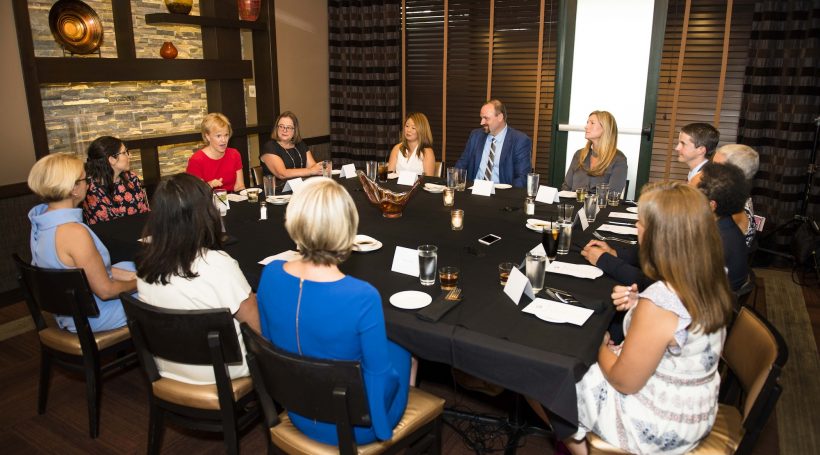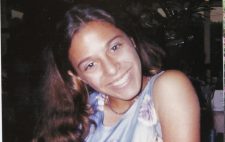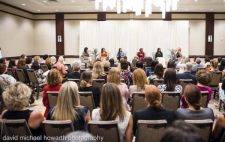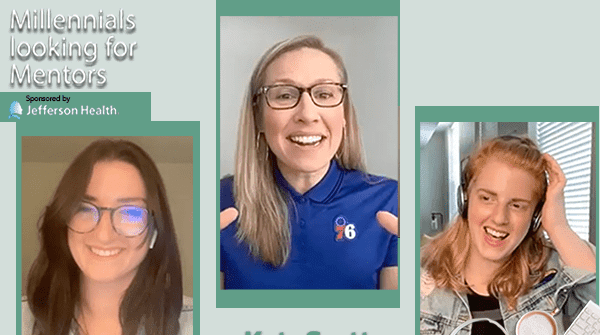Presented by

Photos by David Michael Howarth
Continuing our influential roundtable series on topics important to South Jersey, SJ Magazine gathered physicians, advocates, patients and survivors for an intimate discussion on breast cancer. The conversation was educational, meaningful and, at times, deeply moving.
Joe Boiler, Advocate/husband of a survivor
Kristin Brill, MD, Program Director, The Janet Knowles Breast Cancer Center, MD Anderson Cancer Center at Cooper
Suzanne Corson, Executive Director, Komen CSNJ
James Crawford, MD, Breast surgeon, Virtua
Michele Fantazzio, MD, Breast surgeon, Jefferson Health
Diane Gillum, MD, Breast surgeon, Jefferson Health
Malini Iyer, MD, Breast surgeon, Lourdes Health System
Veronica Kraft, Survivor/advocate, American Cancer Society
Rachel Levenbach, MD, Oncologist, RCCA Mount Holly
Kathleen Covert-Mininno , Patient/advocate
Elizabeth Revesz, MD, Breast surgeon, Inspira Health Network
Kahyun Yoon-Flannery, DO, Breast surgeon, Jefferson Health
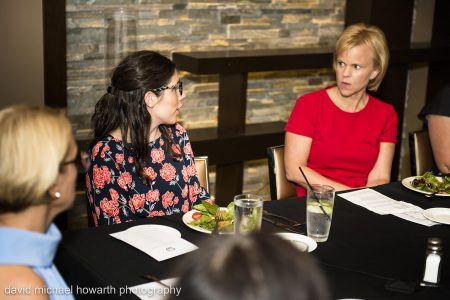
On the diagnosis
When I was diagnosed, my surgeon told me to put a team together to help me. He said this is what you’re going to face, and these are your options. No disrespect to my surgeon, but I heard nothing after he talked about getting a team because in my mind, I was thinking, “Ok, my mom’s 88. My son’s away at grad school. My sister doesn’t drive. I don’t have a team; like, how am I going to do this?”
Veronica Kraft
Women generally come in thinking it’s more bleak than it is. They come in saying, “I’ve got cancer. That’s it.” They’re making their plans, but you educate them, show them a treatment plan, give them hope. That’s a nice role to have.
Kristin Brill
What was important for me was once I found my team and I felt comfortable with them, I just put my trust in them. They held my hand through it, and that compassion, that caring, that touch, to see you as a person and to make you feel when you’re in their office that you are the only patient they have is incredible, and that’s what made me feel safe and confident. If I sent an email later or a text later or I called, they were responsive. To me, that made me feel like I was the only person they were taking care of. And after that, I was like ok, I’m good, I can do this.
Kathleen Covert-Mininno
The moment you get the news that you’re a cancer patient, sprinting comes to mind – I need to get surgery done as soon as possible. The support the patient needs is to let them know that, yes, you are sprinting now, and I am sprinting with you.
Joe Boiler
On a Tuesday I was Veronica, and I was working at the University of Pennsylvania. On Wednesday, all of a sudden, I was a cancer patient. Once you get that diagnosis, then it’s a whole new world, it’s a foreign world and you don’t know the language and you don’t know what things mean or you’re given options, but you don’t know what they mean.
Veronica Kraft
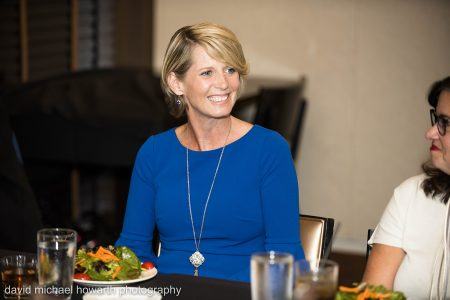
On myths
Patients who’ve had bilateral mastectomies sometimes believe they can’t get breast cancer again, so they don’t always want to go forward with treatment. But even though you don’t have any breast tissue, there’s always a chance a cell got out and it can develop somewhere else, like the bones or lungs.
Rachel Levenbach
Patients sometimes feel if they do more surgery, they’re going to have a better outcome. I try to dispel that myth. Patients need to know there’s very clear data saying extra surgery doesn’t increase survival.
Malini Iyer
Many patients believe mammograms are protective and that they’re preventative. That isn’t true. Mammograms help find cancer early so we can treat it when it is highly treatable and highly curable.
James Crawford
A misconception is that mammograms find every cancer. So when a mammogram is normal, a woman may ignore a small lump or a change in the breast thinking they’ve got a pass until next year. You cannot ignore symptoms – if you have a lump, you must have it evaluated.
Malini Iyer
On treatment decisions
I ask what decision will make them able to sleep at night. I tell patients that just a double mastectomy isn’t a 100-percent guarantee you’ll never have to deal with this again. But I don’t want my patients walking out of my office thinking they have to spend the rest of their life questioning every cough, every feeling. It’s a really fine line. So I always try to have that discussion and tell them we’ll make the decision together.
Kahyun Yoon-Flannery
Conversations about treatment can be very difficult and take a lot of time. It’s important to talk about the pros and cons of each approach, and try to get any concerns they have. If I try to understand where they’re coming from, it’s more likely they’ll understand what I’m telling them.
Diane Gillum
What not to say to a cancer patient
Here are some things not to say: “God only gives you what you can handle” and “You’re tough, so you can do this,” which sounds wonderful but really is not, because you don’t feel tough. The people who were the most helpful were people who gave me a hug and made sure I knew they were there.
Another thing I found to be really insensitive, but I think it was supposed to be funny and to lighten the mood was, “Oh, you’re going to get a new set of boobs.” I can’t tell you how many people say that, as if I chose to have cancer so I could have a nice…It’s not fine to make those kinds of jokes. It makes them feel better, because they’re uncomfortable, but it doesn’t make me feel comfortable.
Kathleen Covert-Mininno
Once I made the choice to have a bilateral mastectomy, some people would ask, “Did you get a second opinion?” “Did you think about a lumpectomy?” Well, yeah, I barely slept – I was thinking about everything all the time. Once someone makes a decision, the best way to be supportive is to listen and maybe say, “How did you come to that decision?” Then we get to explain our choice, which gives some power back to us, because cancer kind of took that power away.
Veronica Kraft
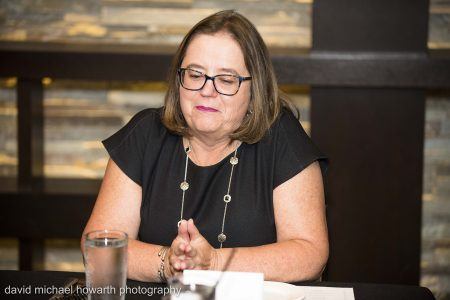
On life after cancer
The aftermath of chemotherapy, specifically for my wife, is neuropathy of the stomach, which means she has stomach pain because her stomach doesn’t digest food correctly anymore. So on the outside, she might present as a woman who survived cancer and is strong. On the inside, she can’t eat food, because it impacts her stomach or she has pain. It’s a constant reminder something is still a part of her as a result of breast cancer.
Joe Boiler
In the beginning, it’s like just go, go, go, go. They have to do a million things. Then, all of a sudden, they finish treatment and they can stop. That’s when they think, “Oh my god, I just had breast cancer.” It hits home, and that’s when depression can set in.
Rachel Levenbach
The anxiety that breast cancer creates is something you never get away from. There’s no medication that can fix that. You just continue a course over the years that reassures you that you can survive to see your kids get older.
Joe Boiler
As physicians, we’re all kind of guilty of this: We see our patient for the year follow-up, or the two year follow-up, and we think, “Oh, you look great, breast cancer’s not there, your mammogram is negative, everything’s great.” We don’t hear that they have trouble eating or the chemo we gave is still causing side effects. So sometimes we kind of have to step back and realize things may not be great when they leave the office. They need to know we’re listening to them.
Rachel Levenbach
I met a gentleman on the train going up to New York two days after my diagnosis, just by coincidence, and he talked about his journey with cancer. He said to me, “You will forget the pain, but you will remember the compassion.” And five years later, that is true every day. You truly forget that pain, but you remember everybody who was there for you.
Veronica Kraft
At the end of the day, when my kids are older and they look back, I’m hoping they’re proud of me. That they see I tried to go through the disease as best as I could. I worked out, I took care of them, I took care of the house, everything, I worked part-time once I could. I’m hoping they’ll look at me and see a very strong person, so when they have to struggle through something in life, whatever it may be, maybe they can draw from the way I handled this and use that for strength.
Kathleen Covert-Mininno
On cancer research
What breast cancer was 35 years ago is different now because of research. A lot of times we hear, “How come they haven’t found a cure?” The reality is that’s because they keep finding new diseases. It’s not that same disease. It’s important we come together and support breast cancer research because of how many women will be diagnosed.
Suzanne Corson
I tell patients all the time, 15 years ago you got diagnosed with breast cancer, you were getting chemotherapy. Now we have large numbers of patients who don’t need chemotherapy. We have patients with metastatic breast cancer who have long lives. Breast cancer has come a long way. Patients are living so much longer because of research.
Rachel Levenbach
In the past, the research was a lot more lab-based and it took forever to get into the clinical setting. And largely because of patients and advocates, the way we do research now is much more result-oriented, it takes less time.
Diane Gillum
The physician’s relationship with the patient
Breast surgery is a field where you can be there for your patients. I always feel I know what they’re going through, so I can be compassionate. I can hold their hand and let them cry on my shoulder. I’ll be there for that.
Elizabeth Revesz
Every patient inspires me. They have to take care of the kids, cook dinner, make money and do all the things they need to do – and get better. That’s why I tip my hat to my patients. Some of them are coping better than others, but they’re all coping.
Michele Fantazzio
I learned a very valuable lesson from one of my patients who had a recurrence. We kept treatment going and going and going, and finally her husband said to me, “What are you doing? You all you think you’ve got the ability to do this, but now there is no quality of life.” I learned one of our jobs is to help see patients through the end of treatment also. She passed away from breast cancer, and I will never forget what she taught me.
Kristin Brill
I had a patient who faced breast cancer and had difficultly every step of the way. I was young at the time, so I was learning about how women cope. But she got through it, and she actually climbed Mt. Rainier. She even brought me back the flag that was at the top. If you had ever told me one of my patients would climb Mt. Rainier, I would not have thought it would be her. Our patients are inspirational. They make you want to come back and do your very best.
Diane Gillum
MENU
Soup or Salad Choice
Duo Salad – mixed greens, balsamic dressing
or
Italian Wedding Soup
Entrée Choice
Chicken Marsala
or
Short Rib Ragu – short rib, fettuccine, tomato sauce
or
Pan-Seared Salmon – arugula, capers, white beans, lemon
Dessert
Cheesecake


